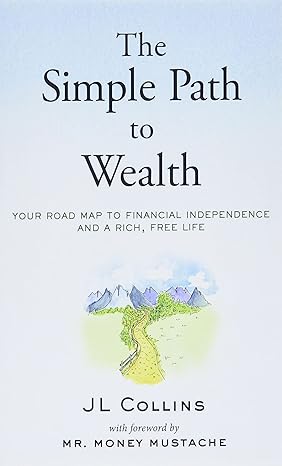Overview : The Simple Path to Wealth
- Book Title: The Simple Path to Wealth
- Author: JL Collins
- Publication Date: June 2016
- price: $22.49
- Pages: 286
Overview of the Book
JL Collins, often referred to as "The Godfather of FI" (Financial Independence), is the author of The Simple Path to Wealth: Your Road Map to Financial Independence and a Rich, Free Life. He began his investment journey in 1975 and, in 2011, started his blog, jlcollinsnh.com, which features his renowned Stock Series. The book, which has sold over 400,000 copies and has been translated into multiple languages, originated from a series of letters he wrote to his daughter about money and investing
Introduction
In the ever-evolving world of personal finance and investing, J.L. Collins' "The Simple Path to Wealth" stands out as a beacon of clarity and wisdom. This comprehensive review explores how Collins demystifies the complexities of wealth-building, offering readers a straightforward approach to achieving financial independence.
Book Summary
"The Simple Path to Wealth" is more than just a guide to investing; it's a philosophy for life. Collins, drawing from his decades of experience in the financial world, presents a compelling case for simplifying one's approach to money management. The book's central thesis revolves around the power of index fund investing, particularly through low-cost options like Vanguard's VTSAX. Key points include:
- The importance of living below your means
- Harnessing the power of compound interest
- The superiority of index funds over active management
- Strategies for navigating market volatility
- Tax optimization techniques for long-term wealth accumulation
Analysis of Themes
Simplicity in Investing
Collins argues convincingly that complexity is the enemy of successful investing. By advocating for a portfolio centered around broad-market index funds, he eliminates the need for constant market timing and stock picking, activities that often lead to subpar returns for individual investors.
Financial Independence and the FIRE Movement
The book aligns closely with the principles of the Financial Independence, Retire Early (FIRE) movement. Collins provides a roadmap for readers to achieve financial freedom, emphasizing that wealth is not just about money, but about the options it provides.
Psychological Aspects of Investing
Perhaps one of the most valuable aspects of the book is its focus on investor psychology. Collins stresses the importance of maintaining emotional discipline during market downturns, a crucial skill for long-term investing success
Writing Style
Collins' writing is refreshingly accessible, making complex financial concepts digestible for readers of all backgrounds. His use of anecdotes and humor keeps the material engaging, while his straightforward explanations ensure that key concepts are clearly understood.
"The market is the most effective wealth creation machine ever invented. But in the short term it is a continuously swinging pendulum between fear and greed."
This quote exemplifies Collins' ability to distill complex market dynamics into relatable terms, helping readers grasp the importance of long-term thinking in investing.
Strengths and Weaknesses
Strengths:
- Clear, actionable advice for investors at all levels
- Strong emphasis on low-cost index fund investing
- Practical strategies for tax optimization
- Addresses the psychological challenges of investing
Weaknesses:
- May be too simplistic for advanced investors seeking complex strategies
- Limited discussion of alternative investment options beyond stocks and bonds
- U.S.-centric approach may not fully apply to international readers
Comparison to Other Works
The Simple Path to Wealth" shares similarities with other personal finance classics like "A Random Walk Down Wall Street" by Burton Malkiel and "The Bogleheads' Guide to Investing." However, Collins' work stands out for its more personal tone and its strong ties to the FIRE movement. Unlike books that focus heavily on stock picking or timing the market, such as Peter Lynch's "One Up On Wall Street," Collins advocates for a more passive approach. This aligns his work more closely with the philosophy of John Bogle, the founder of Vanguard and pioneer of index investing.
Highlights from The Simple Path to Wealth
- Financial independence: Focuses on achieving wealth through smart, long-term investing.
- Index funds: Advocates for low-cost, passive investing in broad market index funds.
- The 4% rule: Introduces the concept of safely withdrawing 4% of your portfolio annually in retirement.
- Avoiding debt: Emphasizes living below your means and avoiding high-interest debt.
- Simplification: Encourages simplifying financial strategies and focusing on the essentials.
- Long-term mindset: Stresses patience and discipline in wealth accumulation for financial freedom.
Conclusion
"The Simple Path to Wealth" is an essential read for anyone looking to take control of their financial future. Collins provides a clear, actionable plan for building wealth over time, emphasizing the importance of simplicity, discipline, and long-term thinking. In a world where financial advice is often convoluted and self-serving, this book stands as a testament to the power of straightforward, principled investing. Whether you're just starting your financial journey or looking to refine your existing strategy, "The Simple Path to Wealth" offers invaluable insights that can help you achieve your financial goals.





